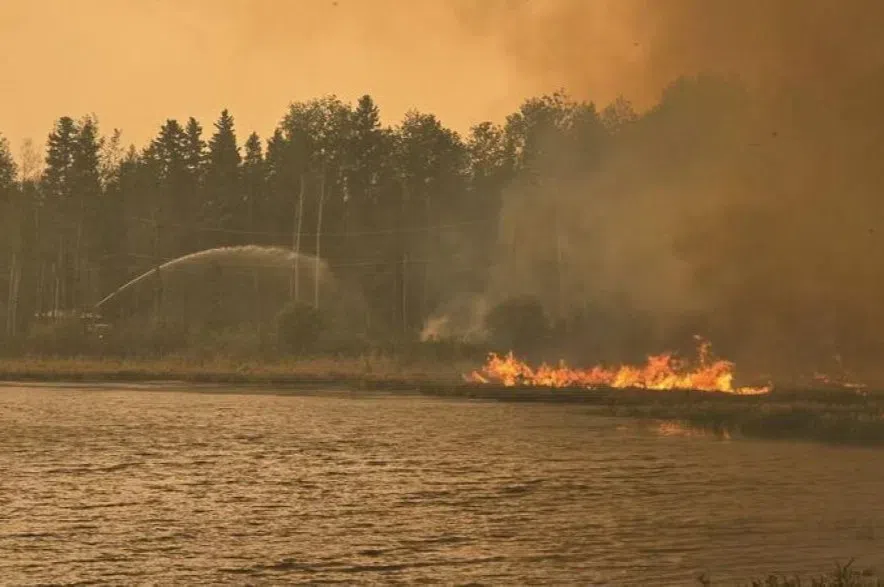By Susan McNeil
There appears to be a lot of public interest in a potential class action lawsuit regarding the government’s response to wildfires in Saskatchewan.
Chad Eggerman, founding partner of Procido Law, which has an office in Saskatoon, said in the five days since his firm first asked for feedback on its website, the response has been high.
Read More:
- Province battling 66 active wildfires, three communities evacuated: SPSA
- Hundreds of wildfires continue to burn different parts of Canada
- Wildfire crisis exposes flaws in public alerting landscape
“It was June 27th we put something up on our website, and since then our website has almost crashed. We have thousands and thousands of hits to it. The registration for the webinar crashed as well,” said Eggerman.
The webinar is being hosted on Monday to explore the potential for a grouped proceeding, and the firm said it wants to hear from people who have been affected by the recent wildfires to gauge the situation. Eggerman said they’ve had to add 150 more spots to accommodate the interest.
Class actions are filed using a representative claimant for a large group of affected people. Eggerman initially thought he would have a hard time finding someone willing to take on that role.
“But gosh, I’ve got people fighting that they want to be the representative, insisting they’ve got the better claim,” he said.
Filing a class action claim is a large undertaking for law firms, and they only get paid if they win. Their fees are a percentage of the compensation, and they often take years to conclude. Eggerman explained that Procido is not a large firm.
“It’s going to be quite the fight. We’re up for the fight, but it’s more what we have to do now is figure out if we want to spend the time and resources to do this with no real prospect of getting paid for that, to be honest,” he said.
If the partners of the firm vote to go ahead, they will file to have a judge certify the class action and then proceed to trial. However, between those steps is the process of collecting a large amount of information that details allegations of negligence on the province’s behalf, as the party responsible for the wildfire response and public safety.
The dollar value of damage in Saskatchewan is still unknown, but Eggerman estimated it will be in the billions of dollars.
The latest count from the Saskatchewan Public Safety Agency indicated a total of 2,129 items of value have been burnt by wildfires in Saskatchewan so far this season. That includes 299 homes, 125 cabins and 312 vehicles – the bulk of which come from the Denare Beach area.
“I’m just hearing about the obvious ones at East Trout Lake and Denare Beach, and the houses and cabins in the outfits and camps,” Eggerman said.
Many of the stories have a recurring theme of the government “just not being there,” he said.
“People think that the government has a job to ensure public safety, but now people are feeling really vulnerable because they realize that the government wasn’t protecting people or property in the north at all. They weren’t even there.”
The sense of abandonment is something Eggerman said he noticed himself, and he said that factored into his decision to explore what could be done. His family has a cabin in Narrow Hills in the Lower Fishing Lake area, located only a few hundred meters from a government firefighting base. That proximity gave him confidence the cabin would be well protected, but that wasn’t the case.
As the Shoe fire gained ground, it engulfed the firefighting base. He said his cabin was saved by neighbours who stayed behind to fight the flames themselves.
As the wildfire situation in the north progressed, Eggerman said he monitored the situation closely and believes there were opportunities to put out the fires before they really took off, but that did not happen.
“It almost seems to me that this is just a ‘let it burn’ policy, because it was clear there’s just no resources there,” he said.
He said he became more concerned when he heard people speaking about what they saw as a lack of response.
Eggerman said the lawsuit could force the province take climate change more seriously and to plan to fight more fires in the coming years.
“Whoever the government is has to deal with the fires in the north for the future. This isn’t going to change. We’re not going back to even 1980,” Eggerman said.
Marlo Pritchard, president of the Saskatchewan Public Safety Agency, was asked about the potential lawsuit during a news conference on Wednesday, but said he hadn’t heard about it.











